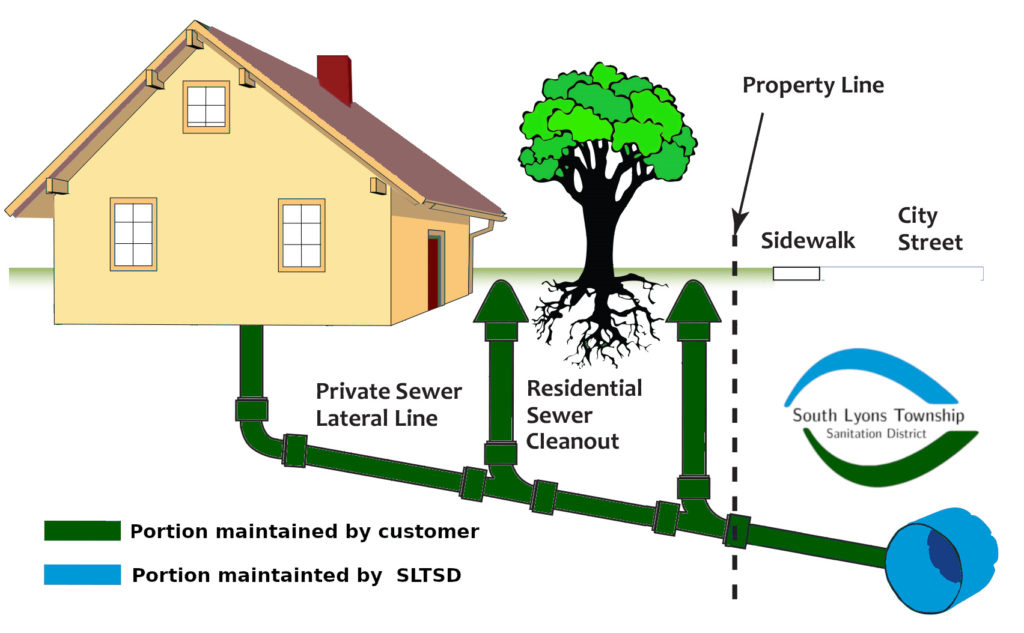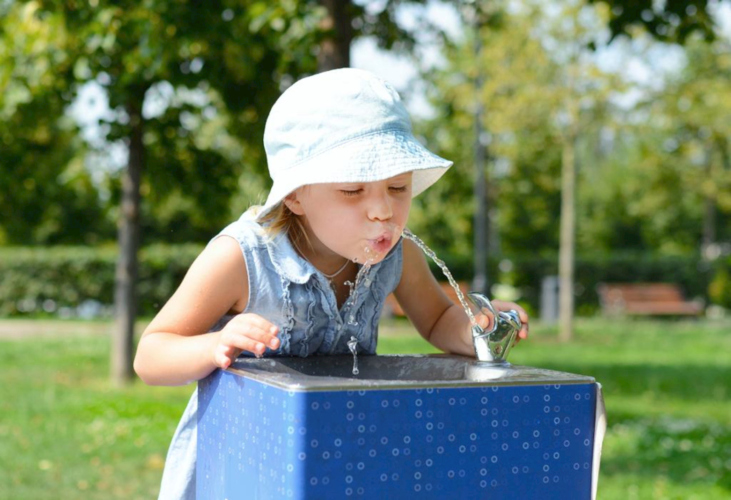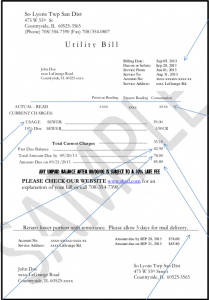In recognition of the fact that a large portion of excessive wet weather flow in sanitary sewer systems comes from the privately-owned sector of the sanitary sewer system, the South Lyons Township Sanitary District has developed a Private Sector Program (PSP). This PSP is intended to prohibit new illegal clear water connections to the sanitary sewer system, compel property owners with illegal clear water connections or sources of excessive infiltration to eliminate them, establish a public information program to enhance awareness of the risks posed by illegal clear water connections, and establish a long-term program under which illegal connections that are costly to correct may be removed over time.

Report A Problem
If you are experiencing a water, power, or sewer emergency or service problem we are available 24 hrs.
This includes problems that you may be experiencing with the following:
- no water service
- low water pressure
- issues with taste, odor or color of your water
- sewer backups
- clogged catch basins
- flooding
- wastewater odors
Property Line Cutoff
You are responsible for the entire length of your sanitary service lateral from your
building to the main line sewer. Its a good idea to take preventative actions to
reduce the potential for problems. Sewer backups in a home or business may be
caused by a number of factors:

1. A power outage can prevent your sump pump from working. To ensure that
your sump pump continues to operate during a power outage, you could consider
purchasing a backup power supply system which typically maintain power to a
sump pump for an hour or two.
2. Private service laterals can become blocked with tree roots. Roots typically
extend underground as far the tree branches extend from the tree trunk. If your
service lateral is within this area, it is more likely to have tree roots. Avoid putting
large pieces of food and grease in your sinks, dishwashers, and garbage
disposals. Sink strainers are designed to capture pieces of food that should be
thrown in the garbage. Grease can block your lateral. It is best to store grease in
something like an empty soup can. Let the grease solidify before throwing it in the
garbage. Construction near your service lateral can cause movement of nearby
ground and weaken it. If you suspect there’s a blockage in your service lateral, a
plumber can investigate it for you. Some plumbers have the ability to televise your
lateral.
3. Main lines – The District televises the main lines every few years to ensure
they are in sound condition. Heavy rainfall (that’s supposed to go in storm sewers
and creeks) can enter the sanitary sewer from many sources and reduce the
available capacity of the main. If you suspect a main line is blocked, please follow
the guidelines outlined below in the section titled “Do You Suspect There’s a Main
Sewer Problem?”, and contact the appropriate government agency to investigate
the situation.
Welcome to your sanitation district
South Lyons Township Sanitary District was first named Countryside Sanitary District. After the City’s incorporation in 1960, the name was changed to the South Lyons Township Sanitary District to avoid public confusion between the sanitary district and the City. The district was formed because of a 1959 special election. The district boundaries are north starting at 50th Street in La Grange, to the south 67th Street, to the west Brainard, and to the east of East Avenue.
The District is governed by a three-member Board of Trustees elected by the voters within our district. The Board meets once a month, generally on the third Thursday of each month at 4:30 PM in the District’s offices located in Countryside. Board meetings are open to the public.
The District is a taxing body. Though most of the revenue for operations is generated from user charges, based on previous year’s water consumption. A small portion of the District’s revenue comes from permit fees.
The District has about 20 miles of sewer lines, 1,600 manholes, and 2 lift stations. We service approximately 1221 Residential, 40 Industrial, and 214 Commercial properties. SLTSD encompasses an area of about1,324 acres, which overlaps the political jurisdictions of the City of Countryside, the Village of La Grange, and a small portion of unincorporated Cook County. Land use within the SLTSD is largely mixed, with about sixty-two percent (62%) residential, and about thirty-eight percent (38%)commercial/industrial.
Our Mission is to provide a high quality public service reclaiming water at the lowest practical cost, while meeting the needs of our customers, ensuring public health and protecting the environment.
The District is governed by a three-member Board of Trustees elected by the voters within our district. The Board meets once a month, generally on the third Thursday of each month at 4:30 PM in the District’s offices located in Countryside. Board meetings are open to the public.
The District is a taxing body. Though most of the revenue for operations is generated from user charges, based on previous year’s water consumption. A small portion of the District’s revenue comes from permit fees.
The District has about 20 miles of sewer lines, 1,600 manholes, and 2 lift stations. We service approximately 1221 Residential, 40 Industrial, and 214 Commercial properties. SLTSD encompasses an area of about1,324 acres, which overlaps the political jurisdictions of the City of Countryside, the Village of La Grange, and a small portion of unincorporated Cook County. Land use within the SLTSD is largely mixed, with about sixty-two percent (62%) residential, and about thirty-eight percent (38%)commercial/industrial.
Our Mission is to provide a high quality public service reclaiming water at the lowest practical cost, while meeting the needs of our customers, ensuring public health and protecting the environment.
We strive to protect public health and the environment through cost effective wastewater collection, treatment to meet present and future community needs.

Covid-19 Impact
According to WEF, the scientific community has found no evidence of viable COVID-19 virus in wastewater systems.
Our testing wastewater for RNA strands of the corona virus might help tell local officials tel how widespread COVID-19 is in in the sanitary district community and whether infections are rising or falling. Known as “sewer surveillance” or “wastewater epidemiology” – wastewater professionals are once again working to protect public health
An important note – finding corona virus RNA in wastewater does not mean it is infectious virus. According to WEF, the scientific community has found no evidence of viable COVID-19 virus in wastewater systems.
Start / Stop service
NEW OWNERSHIP:
Countryside residents are required to obtain a Real Estate Transfer
before they are permitted to close on their property. You can call our
office if you are selling or buying a new property to obtain this transfer
form. If you live in La Grange, we recommend that you call our office to
obtain a final bill. We will also need proof of ownership in order to
transfer the account into your name.
RENTAL PROPERTY:
We recommend that landlords contact the District when their tenant is
moving and request a final bill. Any unpaid charges belong to the
property and a new account will not be opened for a new tenant until all
outstanding charges are paid. A copy of the lease with the Renter’s
name and phone number are required.
WHAT IF I HAVE A CREDIT ON MY ACCOUNT?
We do not refund credits. We will issue a letter to the seller which will
allow them to include this credit in their closing costs.
Emergency Sewer/Water Problems
What is a sewer emergency?
- A backed up basement or lowest level of the home taking in sewage without using water in the home.
- A SLTSD manhole or clean out at the property line that is overflowing onto the ground.
- A surcharged sewer main (such as one caused by heavy rain) causing a sewer back up in homes.
What is a water emergency?
- A broken water main in the street which causes flooding/collapsing of the roadway or icy conditions in the winter.
- A service leak outside of the home in the yard area causing flooding conditions and/or hazardous conditions such as collapse of yard or sidewalk areas, icy conditions in the winter.
- A broken pipe inside the home causing flooding conditions and the inside valve is inoperable. A village registered plumber or a SLTSD technician can make a turn off at the street.
Understanding your bill
FEE STRUCTURE:
You may pay your bill by:
US Mail, or In person at the District offices. Presently we accept Cash and Checks only.
Beginning June 1, 2013 The South Lyons Township Sanitary District will no longer be
billing on an Annual Basis. As previously experienced on your annual bill we will,
instead bill on a quarterly basis which will include the 10% discount if paid by the due
date.
Past Dues
The District uses several methods to collect on past due accounts. We normally try to
work with our customers that are having a hard time making payments. After several
unsuccessful attempts are made a lien may be filed against the property. For seriously
delinquent accounts, water service may be terminated or the sewer connection may be
plugged.
Closings (also see “Account Info)
If you are planning to sell your property, please be sure that you, or your attorney,
contact the District for a final bill to ensure that charges through the closing date are
properly allocated. If you are a resident of the City of Countryside, or the Village of La
Grange please notify the City or Village , and the they will in turn advise the District or,
please contact the District directly.
FEE STRUCTURE:
Basic User Charge: The basic user charge is based of $.79 Per 1,000 gallons of
metered water consumption which is applied to all users to recover O,M & R
(Operation, Maintenance & Repair) costs.
Debt Service Charge: A debt service charge was established at the rate of $1.19 per
1,000 gallons to each user of the wastewater facility.
Late Fee: A 10% late fee is applied to the Usage Charge if not paid by the Due Date.
Rates: A minimum charge of $13.00 per Month is applied to all users whose water
consumption does not exceed 6602 gallons per Month. This minimum charge consists
of $5.20 for O, M & R costs, and $7.80 for debt service costs. Usage in excess of 6602
gallons per Month will be charged at a rate of $1.98 per 1,000 gallons. This rate
consists of $.79 for O, M & R costs, $1.19 for debt service costs.
All commercial, industrial, governmental and institutional users shall pay $1.98 per
1,000 gallons of water used per month. This rate is based on $.79 for O, M & R costs
and $1.19 for debt service costs.

Permits
A separate permit must be obtained by all owners, contractors, or builders
engaged in the replacement, repair or construction of Sanitary Sewers
and building services within the jurisdiction of the South Lyons Township
Sanitary District.
If your project is within the sewer service area of the South Lyons
Township Sanitary District, you are obligated to contact the District office
and comply with their permit requirements.
Following are General Provisions, Insurance Requirements, and Permit
Applications that can be downloaded and printed. Please contact our
office at the number(s) listed above with any questions.
Before a Sewer repair/disconnect/construction project can be completed an inspection
must be done and approved by our superintendent. If you complete your
job without an inspection you may be required to re-dig the project, so
that an inspection can be made.
Permit agreements
Sewer Permit General Conditions
Sewer Permit Insurance Requirements
SEWER PERMIT FEE SCHEDULE
| PERMIT CATEGORY | RESIDENTIAL PROJECT | COMMERCIAL PROJECT |
| Sewer Repair Permit (0′ – 25′) * | $100 | $1,000 |
| Sewer Repair Permit (25′ +) ** | $250 | $2,500 |
| Sewer Construction Permit – Main Extension | $5,000 | $5,000 |
| Disconnection/Reconnection Permit: (Lateral Connection) | $1,100 | $5,100 |
(**) Sewer Repair Permit 25’+: includes repair, modification, or replacement lengths greater
than twenty-five fee, the installation of manholes and the installation of grease basins
Residential Projects shall include single family structures and multi-family structures with less than
five residential units.
Commercial Projects: include all non-residential structures and all multi-family structures with
greater than four residential units.
Construction Permit Form
The intended use of this application form is for the installation of sanitary sewer, manholes, grease
basins, or other such new sewer system components.
Sewer Repair Permit
REPAIR PERMIT The intended use of this application is for projects that are generally limited in scope involving
primarily the repair, replacement, or maintenance of sewer system components.
Disconnect/Demolition Permit Form
DISCONNECT-DOMOLITION PERMIT FORMThe intended use of this application is for projects that involve the demolition of an existing land use
and/or the modification of an existing sewer service lateral through its disconnection from the sewer
service.
